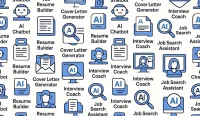Introduction – Why Entry-Level Jobs Matter
For generations, entry-level jobs have been the launching pad for professional growth. They are where new graduates learn workplace dynamics, build experience, and carve out career paths. But in today’s AI-driven economy, those very opportunities are under scrutiny.
A new Stanford study warns that early-career job postings have declined significantly in fields vulnerable to AI automation, sparking headlines about a “vanishing entry-level workforce.” Meanwhile, opinion pieces argue that the loss of junior roles could reshape how Gen Z navigates employment.
Yet not everyone agrees. Some experts insist entry-level hiring will adapt, not disappear. So, what’s really happening — and what does it mean for job seekers and employers alike?
Worried about entry-level opportunities? Search Jobs Now →

The Decline of Traditional Entry-Level Roles
The Stanford study found a notable drop in junior-level listings for coding, customer service, and clerical positions — exactly the type of work AI systems excel at automating.
- Routine tasks such as ticketing, scheduling, and first-tier customer queries are now being handled by chatbots or algorithms.
- In industries like finance and insurance, AI tools streamline data entry and compliance, reducing demand for entry-level analysts.
- For Gen Z graduates entering the workforce, this means fiercer competition for fewer openings.
These trends explain why so many young job seekers report sending out hundreds of résumés with little success.
What’s Driving This Change? (AI’s Role)
Artificial intelligence is rapidly taking on repetitive, rules-based functions once performed by junior staff. Unlike past waves of automation, AI impacts not just physical tasks but also white-collar knowledge work.
- Customer service chatbots now replace call center trainees.
- AI coding assistants reduce the need for junior software developers.
- Automated research tools handle tasks once assigned to graduate interns.
Gen Z, the youngest demographic in the workforce, is feeling these effects first. Many report frustration at a “vanishing first rung” on the career ladder.
Counterpoint – Entry-Level Jobs Aren’t Going Away
Not all experts agree with the “doom and gloom” narrative. HR analyst Josh Bersin recently argued that entry-level jobs are not disappearing they are evolving.
- Companies still need fresh perspectives and early talent pipelines.
- Entry-level staff remain critical for building organizational culture.
- Eliminating entry-level hiring often leaves firms with a mid-career skills gap down the road.
In short, while AI is reshaping tasks, employers still require human adaptability, creativity, and problem-solving.
Employers: Don’t let headlines scare you. Build your next generation of talent today. Post a Job Now →
Future-Proof Entry-Level Opportunities
If some entry-level roles are shrinking, others are emerging or strengthening. The opportunities lie where human oversight, empathy, and adaptability matter most.
- Resilient Sectors:
- Healthcare: nurses, assistants, and technicians remain in high demand.
- Logistics: supply chain coordination requires problem-solving beyond algorithms.
- Renewables & skilled trades: growth areas resistant to automation.
- Hybrid AI-Human Roles:
- AI auditors, compliance officers, and quality-check specialists.
- Data integrity and human-in-the-loop systems.
- Skills in Demand:
- Critical thinking, adaptability, coding, and data analytics.
- Cross-functional collaboration and communication.
What Job Seekers Can Do (Gen Z Focus)
For young graduates navigating this uncertainty, the message is clear: adaptability is the new job security.
- Reskill & Upskill – Platforms like Coursera, Google Certificates, and LinkedIn Learning provide affordable pathways into digital skills.
- Focus on Transferable Skills – Problem-solving, communication, and data literacy bridge industries.
- Leverage Internships & Projects – Even unpaid internships or project-based work can help build portfolios.
- Networking Matters – Building connections can open hidden opportunities.
Ready to build a career that lasts in the AI era? Search Future-Proof Jobs on WhatJobs →
Balance AI with Human Talent
While AI transforms routine work, businesses still need adaptable people to innovate, lead, and grow. Post your job on WhatJobs and find the talent that technology can’t replace.
Post a Job Now →Employer Playbook – How to Keep Entry-Level Hiring Strong
Employers face a dilemma: cut entry-level roles to save costs, or invest in early-career talent to ensure long-term growth. The smartest companies are choosing the latter.
Best Practices for Employers:
- Offer training & mentorship – Build loyalty and retention.
- Balance automation & human roles – Don’t replace every entry-level task with AI.
- Communicate career paths – Gen Z wants to see a future, not just a paycheck.
- Diversify hiring pipelines – Broaden access to non-traditional candidates.
Start hiring with confidence. Post your entry-level job on WhatJobs today
Conclusion – The Future of Entry-Level Jobs in an AI World
The debate over AI and entry-level jobs is not about extinction, but evolution.
- Some roles will disappear.
- Others will adapt.
- Entirely new positions will emerge.
For job seekers, success means reskilling, staying flexible, and pursuing industries where human value is irreplaceable. For employers, the challenge is building resilient pipelines of early-career talent while leveraging AI responsibly.
At the center of it all, WhatJobs remains the bridge — connecting employers and job seekers in a rapidly shifting labor market.
FAQ (SEO Schema-Ready)
Are entry-level jobs disappearing because of AI?
Not disappearing, but shifting. AI reduces demand for routine roles, while creating new opportunities in oversight, compliance, and problem-solving.
What entry-level jobs are safe from automation?
Healthcare, logistics, skilled trades, and human-centric roles remain resilient.
How can Gen Z find jobs in the AI era?
By reskilling, building transferable skills, and targeting future-proof industries.
Which industries are still hiring entry-level roles?
Healthcare, hospitality, logistics, and renewable energy are expanding.




